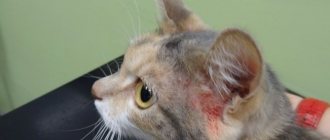Cats, unlike dogs, are more reserved animals who do not particularly welcome guests into the house and prefer to hide from them in far corners. This is largely due to the fact that, by nature, mustachioed pets are introverts. However, inexperienced owners may not be aware of this and therefore become concerned if their cat hides in dark places, attributing this behavior to illness. The article will analyze in detail the reasons for this habit, and also provide recommendations on how to rid your furry pet of it.
Signs of a physical illness
Although animal psychologists are sure that in most cases, hiding in a secluded place is associated with the character of the cat, one should not discount such an unpleasant factor of such behavior as the presence of pathological processes in the body. This is especially true in cases where the habit arose suddenly, although the cat had not done anything like this before. That is why the owner must know which behavioral reactions are characteristic of his animal and which are not.
Veterinarians advise owners who are concerned that their furry friend has begun to hide in a dark corner to pay attention to such painful symptoms that appear in parallel, such as:
- The animal does not eat anything for a long time.
- Uncontrollable thirst or, conversely, the pet practically does not drink water.
- The pet began to sleep for a long time.
- Problems with the gastrointestinal tract in the form of diarrhea.
- The cat is vomiting severely.
- The appearance of the coat deteriorates, loses color, and the fur becomes lumpy or falls out.
If the owner notices one of the above signs, which has arisen in conjunction with the fact that the cat is trying to hide away from prying eyes, then it is necessary to urgently take him to a veterinary clinic for an examination.
What is attractive about a “dark place”?
“Why does a cat hide in a dark place?” — worry the owners whose pet disappears from sight too often. In fact, a “dark place” does not have to be dark at all. It may simply be a secluded corner where the animal is difficult to spot. As a rule, there are several such favorite places in the house, and most often the owners know them. Cats go there to be away from prying eyes. And it’s best to leave them alone and think about why the cat suddenly feels the desire to be left alone with itself.
Psychological discomfort
Cats do not have a strong nervous system, so they are extremely vulnerable to stress disorders. If the owner has wondered why the cat is hiding under the sofa or in the closet, then the answer to this may be strong nervous experiences that the animal has recently undergone. These include:
- moving to a new place of residence, home renovations or long travel;
- sometimes the reason for hiding from the owner is a trip to the veterinarian, after which the cat stops trusting his “boss”;
- the appearance of a new pet, child or simply a stranger on the cat’s “territory”;
- complete lack of communication between the cat and the immediate owner;
- often cats hide because one of the family members treats them badly;
- If a cat escaped from home, but was returned back, then it needs some time to recover from the stress it experienced. As a result, she may hide under the bed or just sit behind a chair. This is nothing unusual, just give her time to adapt.
The owner of the animal must clearly understand that prolonged exposure to stress can cause various pathological processes in the cat’s body that negatively affect its health. First of all, the stomach and heart suffer; over time, the immune system weakens, and this makes the entire body vulnerable. Therefore, you need to save your pet from nervous shock as quickly as possible.
Why did the cat start hiding in a dark place?
By nature, cats are nocturnal predators. Their large representatives generally go out to hunt at nightfall, returning by dawn and hiding in remote places.
Domestic cats behave the same way. They love the dark. During the day they often doze off and wake up only when they need to eat or relieve themselves. During the day, cats can sleep:
- among the clothes in the closets;
- in boxes;
- far corners, under beds or sofas;
- behind radiators;
- in laundry baskets;
- behind the chests of drawers;
- behind kitchen units;
- in washing machines.
You can even find your pet in pots, vases and flower pots. But why does the cat constantly hide in a dark place and prefer to sleep there? The answer is that our cats only doze in plain sight; they are always listening to what is happening. But they also need to sleep soundly to regain strength. Therefore, they choose the safest and darkest place for themselves. They feel more comfortable where the walls of the “shelter” touch their body.
Pregnancy
Pregnant cats sometimes behave very strangely. However, it is important to know that during this period their instincts, laid down by nature itself over thousands of years of evolution, become more acute. In particular, the expectant mother begins to take care of kittens even before the moment of their birth. This is expressed in the form of the fact that she is actively looking for a secluded nest where no one will disturb her.
Caring owners should foresee this moment and arrange such a nook for the animal. The ideal option is a regular cardboard box lined with warm material at the bottom. Such a measure will save owners from searching in the future for squeaking kittens, which the fluffy beauty will hatch in the most inaccessible place.
During pregnancy, cats often become irritable and aggressive; they can meow loudly and even hiss at the owner. Therefore, it is better to save them from the annoying attention of children, as well as loud sounds, so as not to once again disturb the animal, which is already on the verge of nervous exhaustion.
Away from management
The presence of a “main” cat in the house can also play a role, in whose presence the weaker cat or female cat hides in a dark place. Some foreign felinologists even recommend creating special cozy “nests” and tunnels for such animals from paper bags or boxes, along which they can walk to a bowl or tray without fear. If you are going to make one of these, don’t forget to make a hole in the middle so that the quiet one can escape if he meets an enemy in this corridor.
Age
If at an early age a cat runs away to dark places because it is easier to take the owner by surprise, then with older animals the situation is not so clear. A decrepit pet loses its senses, it is no longer attracted to active games and noise, so it is not surprising that it wants to sleep away from all the fuss.
Be respectful of your old pet's needs. He needs more time to recuperate, so try not to make noise in the place where your tailed friend prefers to rest. Veterinarians note that if an elderly animal is not given plenty of rest, it will significantly shorten its life.
In what cases is it necessary to contact a veterinarian?
If there is no appetite and lethargy, you should show the animal to the veterinarian.
If the cat, in addition to the desire to hide in a dark place, has the following deviations, it is necessary to show the animal to the veterinarian:
- Lack of appetite;
- Increased thirst;
- Refusal of water;
- Heavy discharge from the mouth, nose, or eyes;
- Purulent discharge;
- Changes in the consistency and smell of excrement;
- Change in the color and odor of urine;
- Dull coat, baldness;
- Skin rashes, suppuration;
- Frequent scratching, licking;
- Cough, sneezing, vomiting;
- Lethargy, drowsiness;
- Loss of coordination;
A cat’s desire to hide in a dark place, especially when it is not eating or drinking, is caused by many reasons. An attentive and caring owner will respond in a timely manner to changes in the pet’s behavior and will do everything possible to restore a comfortable environment.
Correction methods
So, above it was described in detail why a cat hides in dark places at home. Now it’s worth moving on to questions about how to correct this behavior or make it less risky for the animal. In this regard, experts offer a number of effective recommendations, depending on the cause of the behavioral act:
- In case of stress disorders, it is necessary to completely eliminate the reason that makes the cat want to hide in the far corner. In addition, it is permissible to use light sedatives, presented in the form of tablets and drops, which the pet should drink at a time when stress is especially strong.
- If the cat was hiding due to any disease, and in addition the owner noticed aggravating symptoms, such as diarrhea, vomiting or severe thirst, then it is necessary to take it to a veterinary hospital.
- In cases where the need for privacy in dark places is related to the pet’s character traits, you should arrange a safe and quiet corner for him, where he will feel comfortable when strangers come into the house.
- During pregnancy, provide the expectant mother with a nest, which is quite simple to build from the most common means at hand. Then show it to the cat, let her sniff it and examine it carefully. If she didn’t like the place, then move the structure to the room where she already gave birth or where she often went in search of a safe shelter.
Finally, I would like to say that in most cases there is nothing wrong with hiding a furry friend in secluded places. The owner must treat such “oddities” of his pet with understanding and is obliged to protect him from a fatal accident, expressed in getting into the drum of a washing machine along with laundry or being locked in a closet. If the habit appeared abruptly and is accompanied by painful signs, then it is worth showing your pet to a doctor, this will protect him from the risk of dangerous pathologies.
Photophobia
In some cases, the desire to find a dark place causes photophobia.
In some cases, the desire to find a dark place causes photophobia. This phenomenon occurs when daylight makes the cat uncomfortable. The animal spends daylight hours in dark shelters.
Photophobia occurs with the development of eye diseases. In addition to them, discomfort and pain are caused by mechanical damage to the eyes and the entry of foreign objects. Excessive lacrimation, pus and redness of the eyeball indicate that you cannot postpone a visit to the veterinarian.
Wild, untamed cats are prone to fear of light.
This phenomenon is often observed in feral kittens. Such cats feel vulnerable during the daytime and tend to wait in a secluded place until dark.
If an outdoor cat gets into the house, it will hide in a secluded place for most of the day. Such animals experience severe stress and do not even come out for bait. The only way to help a cat is to leave it alone, which is why you need to be attentive to it.
At first, the animal will come out of hiding at night. If the atmosphere at home is calm and friendly, the cat will appear during the day. A gentle, unobtrusive attitude and delicious food will help you win him over.
If a cat likes to hide in a dark place, it is provided with houses - shelters located at a height of 1 meter. They are combined with bridges, shelves and scratching posts.
A dark place is an escape from stress
It often happens that a cat that was previously absolutely calm and open to communication began to hide in dark places if it found itself in a stressful situation. Most often this is a move. A cat, which is naturally cautious and does not like change, needs time to get used to a new environment and feel comfortable in it. To reduce the animal’s anxiety, you can initially place it in one small room to give it the opportunity to get comfortable. Be sure to take with you from the old house your favorite bed or bedding, bowl, tray, toys - everything that will comfort the mustachioed new resident.
In the same way, sometimes a kitten hides in a dark place when it finds itself in a new family. There is no need to force events by forcing him to go “in public” - most likely, he will do it himself when he is ready. It’s just that a baby who was adopted from another home will need less time to adapt than his brother from the street or from a shelter. With animals that have not previously known human society, you need a little more patience and tact.











